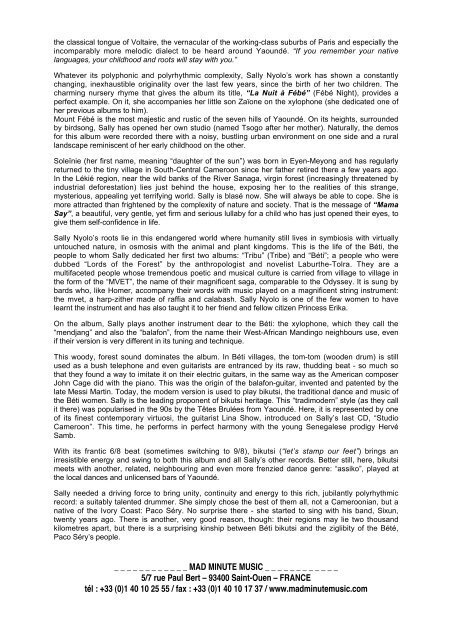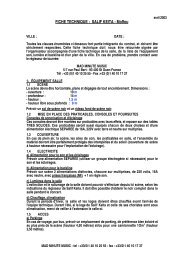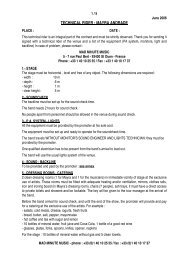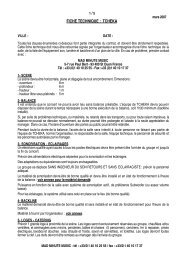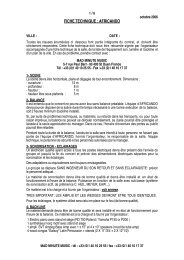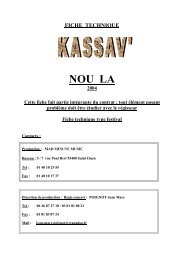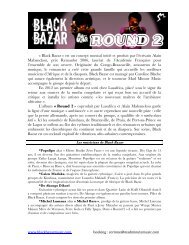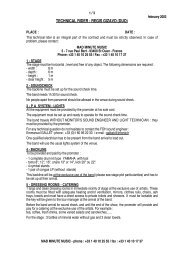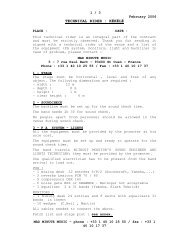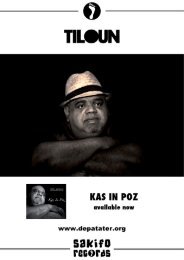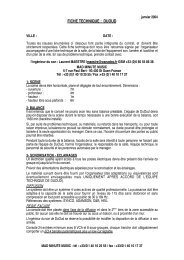SALLY NYOLO - Mad Minute Music
SALLY NYOLO - Mad Minute Music
SALLY NYOLO - Mad Minute Music
Create successful ePaper yourself
Turn your PDF publications into a flip-book with our unique Google optimized e-Paper software.
the classical tongue of Voltaire, the vernacular of the working-class suburbs of Paris and especially the<br />
incomparably more melodic dialect to be heard around Yaoundé. “If you remember your native<br />
languages, your childhood and roots will stay with you.”<br />
Whatever its polyphonic and polyrhythmic complexity, Sally Nyolo’s work has shown a constantly<br />
changing, inexhaustible originality over the last few years, since the birth of her two children. The<br />
charming nursery rhyme that gives the album its title, “La Nuit à Fébé” (Fébé Night), provides a<br />
perfect example. On it, she accompanies her little son Zaïone on the xylophone (she dedicated one of<br />
her previous albums to him).<br />
Mount Fébé is the most majestic and rustic of the seven hills of Yaoundé. On its heights, surrounded<br />
by birdsong, Sally has opened her own studio (named Tsogo after her mother). Naturally, the demos<br />
for this album were recorded there with a noisy, bustling urban environment on one side and a rural<br />
landscape reminiscent of her early childhood on the other.<br />
Soleïnie (her first name, meaning “daughter of the sun”) was born in Eyen-Meyong and has regularly<br />
returned to the tiny village in South-Central Cameroon since her father retired there a few years ago.<br />
In the Lékié region, near the wild banks of the River Sanaga, virgin forest (increasingly threatened by<br />
industrial deforestation) lies just behind the house, exposing her to the realities of this strange,<br />
mysterious, appealing yet terrifying world. Sally is blasé now. She will always be able to cope. She is<br />
more attracted than frightened by the complexity of nature and society. That is the message of “Mama<br />
Say”, a beautiful, very gentle, yet firm and serious lullaby for a child who has just opened their eyes, to<br />
give them self-confidence in life.<br />
Sally Nyolo’s roots lie in this endangered world where humanity still lives in symbiosis with virtually<br />
untouched nature, in osmosis with the animal and plant kingdoms. This is the life of the Béti, the<br />
people to whom Sally dedicated her first two albums: “Tribu” (Tribe) and “Béti”; a people who were<br />
dubbed “Lords of the Forest” by the anthropologist and novelist Laburthe-Tolra. They are a<br />
multifaceted people whose tremendous poetic and musical culture is carried from village to village in<br />
the form of the “MVET”, the name of their magnificent saga, comparable to the Odyssey. It is sung by<br />
bards who, like Homer, accompany their words with music played on a magnificent string instrument:<br />
the mvet, a harp-zither made of raffia and calabash. Sally Nyolo is one of the few women to have<br />
learnt the instrument and has also taught it to her friend and fellow citizen Princess Erika.<br />
On the album, Sally plays another instrument dear to the Béti: the xylophone, which they call the<br />
“mendjang” and also the “balafon”, from the name their West-African Mandingo neighbours use, even<br />
if their version is very different in its tuning and technique.<br />
This woody, forest sound dominates the album. In Béti villages, the tom-tom (wooden drum) is still<br />
used as a bush telephone and even guitarists are entranced by its raw, thudding beat - so much so<br />
that they found a way to imitate it on their electric guitars, in the same way as the American composer<br />
John Cage did with the piano. This was the origin of the balafon-guitar, invented and patented by the<br />
late Messi Martin. Today, the modern version is used to play bikutsi, the traditional dance and music of<br />
the Béti women. Sally is the leading proponent of bikutsi heritage. This “tradimodern” style (as they call<br />
it there) was popularised in the 90s by the Têtes Brulées from Yaoundé. Here, it is represented by one<br />
of its finest contemporary virtuosi, the guitarist Lina Show, introduced on Sally’s last CD, “Studio<br />
Cameroon”. This time, he performs in perfect harmony with the young Senegalese prodigy Hervé<br />
Samb.<br />
With its frantic 6/8 beat (sometimes switching to 9/8), bikutsi (“let’s stamp our feet”) brings an<br />
irresistible energy and swing to both this album and all Sally’s other records. Better still, here, bikutsi<br />
meets with another, related, neighbouring and even more frenzied dance genre: “assiko”, played at<br />
the local dances and unlicensed bars of Yaoundé.<br />
Sally needed a driving force to bring unity, continuity and energy to this rich, jubilantly polyrhythmic<br />
record: a suitably talented drummer. She simply chose the best of them all, not a Cameroonian, but a<br />
native of the Ivory Coast: Paco Séry. No surprise there - she started to sing with his band, Sixun,<br />
twenty years ago. There is another, very good reason, though: their regions may lie two thousand<br />
kilometres apart, but there is a surprising kinship between Béti bikutsi and the ziglibity of the Bété,<br />
Paco Séry’s people.<br />
_ _ _ _ _ _ _ _ _ _ _ _ MAD MINUTE MUSIC _ _ _ _ _ _ _ _ _ _ _ _<br />
5/7 rue Paul Bert – 93400 Saint-Ouen – FRANCE<br />
tél : +33 (0)1 40 10 25 55 / fax : +33 (0)1 40 10 17 37 / www.madminutemusic.com


